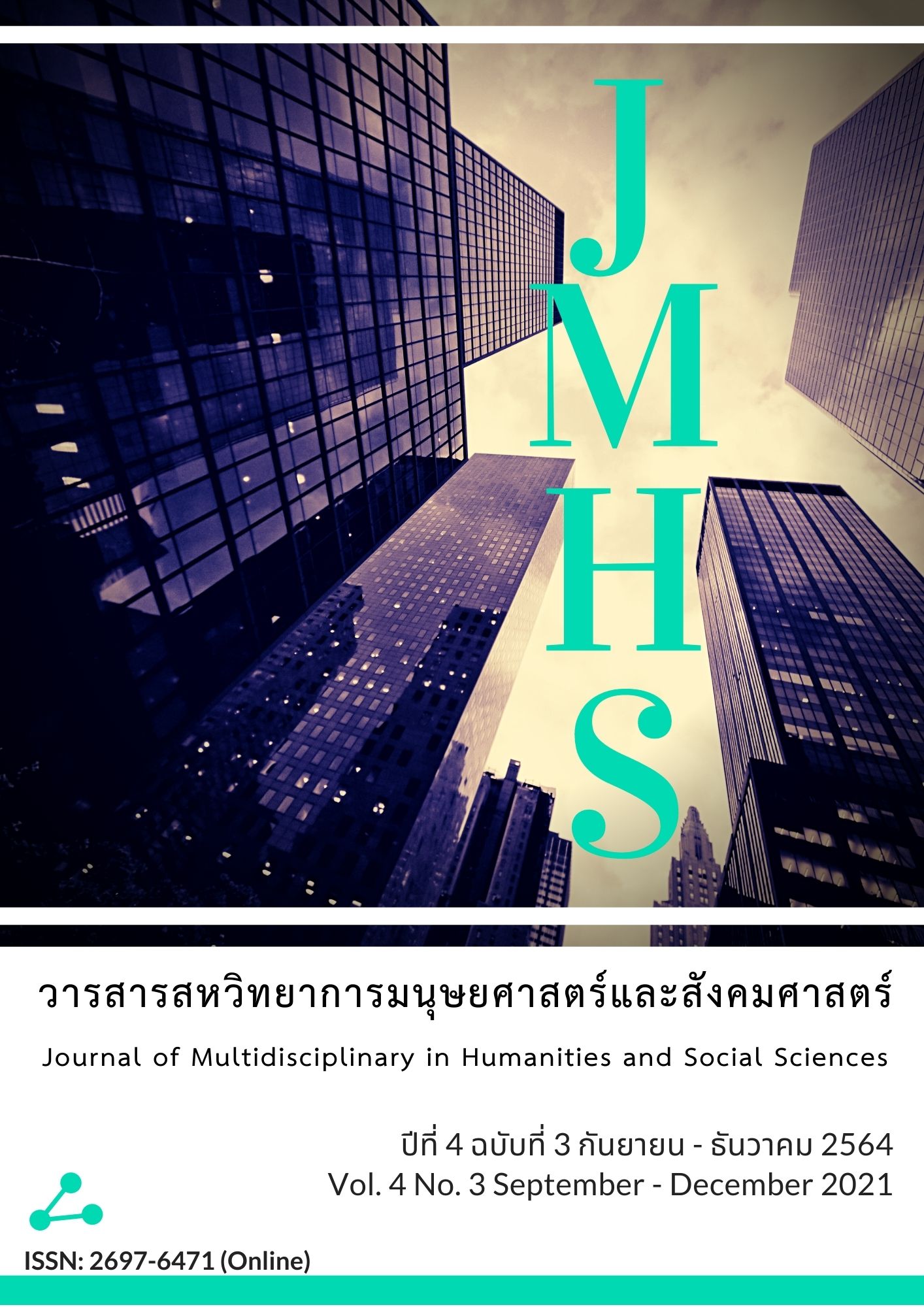The Empowerment of Administrators and Teacher Professional Standards Performance in School under Singburi Primary Educational Service Area Office
Main Article Content
Abstract
This article aimed to study (1) the empowerment of administrators in school under Singburi Primary Educational Service Area Office; (2) teacher professional standards performance in school under Singburi Primary Educational Service Area Office; and (3) the relationship between the empowerment of administrators and teacher professional standards performance in school under Singburi Primary Educational Service Area Office. The sample consisted of 80 schools under the Singburi Primary Educational Service Area Office. The 3 respondents in each school were 1 school director or a deputy director of the school or an acting school director and 1 head of department and 1 teacher. There were 240 respondents. The research instrument was a questionnaire about the empowerment of administrators based on Tracy’s ten steps to empowerment, and teachers’ performance according to Professional Standards for Teachers based on the Regulations of the Teachers Council of Thailand on Professional Standards B.E. 2562 (2019). The statistics used to analyze the data were frequency, percentage, arithmetic mean, standard deviation, and Pearson’s product moment correlation coefficient.
The research results were found as follows: 1) The empowerment of administrators in schools under the Singburi Primary Educational Service Area Office, as a whole, was at a high level. Ranking by arithmetic mean from maximum to minimum, were respect, recognition, trust, clearly define responsibilities, permission to fail, delegate authority, training and development, provide knowledge and information, give feedback and set standard of excellence. 2) Teacher professional standards performance in school under Singburi Primary Educational Service Area Office as a whole were at the highest level Ranking by arithmetic mean from maximum to minimum were the performance of the teacher, relationships with parents and communities and Learning management. 3) The relationship between the empowerment of administrators and teachers’ professional standards performance in schools under the Singburi Primary Educational Service Area Office was found at .01 level of statistical significance.
Article Details
Views and opinions appearing in the Journal it is the responsibility of the author of the article, and does not constitute the view and responsibility of the editorial team.
References
กระทรวงศึกษาธิการ. (2553). พระราชบัญญัติการศึกษาแห่งชาติ พ.ศ. 2542 และที่แก้ไขเพิ่มเติม (ฉบับที่ 2) พ.ศ. 2553 พร้อมกฎกระทรวงที่เกี่ยวข้อง และพระราชบัญญัติการศึกษาภาคบังคับ พ.ศ. 2545. กรุงเทพฯ: โรงพิมพ์องค์การรับส่งสินค้าและพัสดุภัณฑ์.
ข้อบังคับคุรุสภาว่าด้วยมาตรฐานวิชาชีพ (ฉบับที่ 4) พ.ศ. 2562. (2562, 20 มีนาคม). ราชกิจจานุเบกษา. เล่ม 136 ตอนพิเศษ 68 ง. หน้า 18-20.
ประวิต เอราวรรณ์. (2562). การวิจัยและการพัฒนาองค์การในโรงเรียน. (พิมพ์ครั้งที่ 3). กรุงเทพฯ: จุฬาลงกรณ์มหาวิทยาลัย.
รัฐธรรมนูญแห่งราชอาณาจักรไทย. (2560, 6 เมษายน). ราชกิจจานุเบกษา. เล่ม 134 ตอนที่ 40 ก. หน้า 14.
ราชบัณฑิตยสถาน. (2555). ศัพท์ศึกษาศาสตร์. กรุงเทพฯ: อรุณการพิมพ์.
วีรพงศ์ โฆษิตพิมานเวช และ นิยดา เปี่ยมพืชนะ. (2561). การเสริมสร้างพลังอำนาจครูของผู้บริหารสถานศึกษาเอกชน สังกัดสำนักงานเขตพื้นที่การศึกษาประถมศึกษาขอนแก่น เขต 1.วารสารวิชาการและการวิจัย มหาวิทยาลัยภาคตะวันออกเฉียงเหนือ, 8(3), 24-31.
สำนักงานเขตพื้นที่การศึกษาประถมศึกษาสิงห์บุรี. (2561). แผนพัฒนาการศึกษาขั้นพื้นฐาน พ.ศ. 2561-2564 สำนักงานเขตพื้นที่การศึกษาประถมศึกษาสิงห์บุรี. สิงห์บุรี: กลุ่มนโยบายและแผน สำนักงานเขตพื้นที่การศึกษาประถมศึกษาสิงห์บุรี.
สำนักงานเขตพื้นที่การศึกษาประถมศึกษาสิงห์บุรี. (2563). แผนปฏิบัติการสำนักงานเขตพื้นที่การศึกษาประถมศึกษาสิงห์บุรี ประจำปีงบประมาณ พ.ศ.2563. สิงห์บุรี: กลุ่มนโยบายและแผน สำนักงานเขตพื้นที่การศึกษาประถมศึกษาสิงห์บุรี.
สำนักงานเลขาธิการสภาการศึกษา. (2560). แผนการศึกษาแห่งชาติ พ.ศ.2560-2579. กรุงเทพ: พริกหวานกราฟฟิค.
Cambridge Dictionary. (2020, February 26). Empowerment. Retrieved from https://dictionary. cambridge.org/
Damnoen, P.S., Phumphongkhochasorn, P., Punwasuponchat, N., & Srichan, P.W. (2021). The Development of Learning Management Design Models in Compulsory Subjects of the Master of Education Program in Educational Administration Innovation in Order to Enhance the Characteristics of Learners According to the Needs of the Professional Education Institution Administrators. Turkish Journal of Physiotherapy and Rehabilitation, 32(3), 20459 – 20466.
Greenberg, J. (2011). Behavior in Organizations. (10th ed.). Boston: Pearson Education.
Kinlaw, D. C. (1995). The practice of empowerment: Making the most of human competence. USA: Gower Publishing.
Kõiv, K., Liik, K., & Heidmets, M. (2019). School Leadership, Teacher’s Psychological Empowerment and Work-Related Outcomes. International Journal of Educational Management, 33(7), 1501-1514.
Krejcie, R.V., & Morgan, D.W. (1970) Determining Sample Size for Research Activities. Educational and Psychological Measurement, 30(3), 607-610.
Luthans, F. (2011). Organizational Behavior: An Evidence-based Approach. (12th ed). New York: McGraw-Hill.
Newstrom, J. W. (2015). Organization Behavior: Human Behavior at Work. New York: McGraw Hill.
Scott, C. D., & Jaffe, D. T. (1991). Empowerment: Building a Committed Workforce. California: Kogan Page.
Songsraboon, R., Thongtao, J., Damnoen, P.S., & Huanjit, P.S. (2021). Course Management Based on Outcome-Based Education (OBE) of Learning by Working in Real Conditions. Turkish Journal of Physiotherapy and Rehabilitation, 32(3), 20491 – 20499.
Tracy, D. (1990). 10 Steps to Empowerment: A common-sense Guide to Managing People. New York: William Morrow.
Yeo, M. (1993). Toward an Ethic of Empowerment for Health Promotion. Health Promotion International, 8(3), 225-235.


